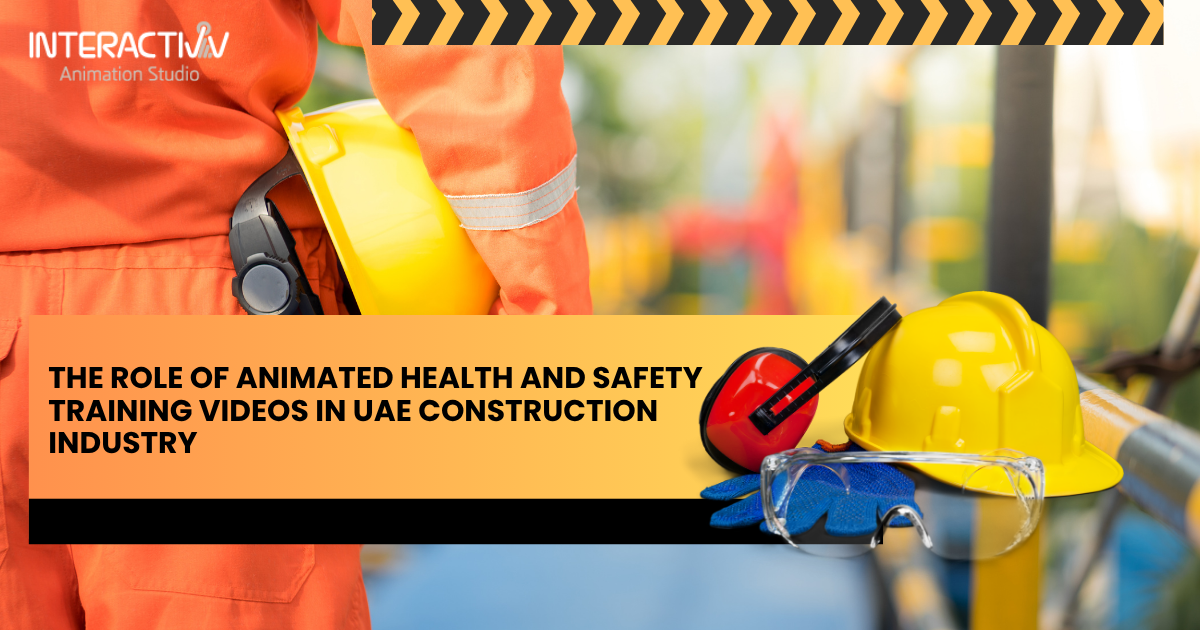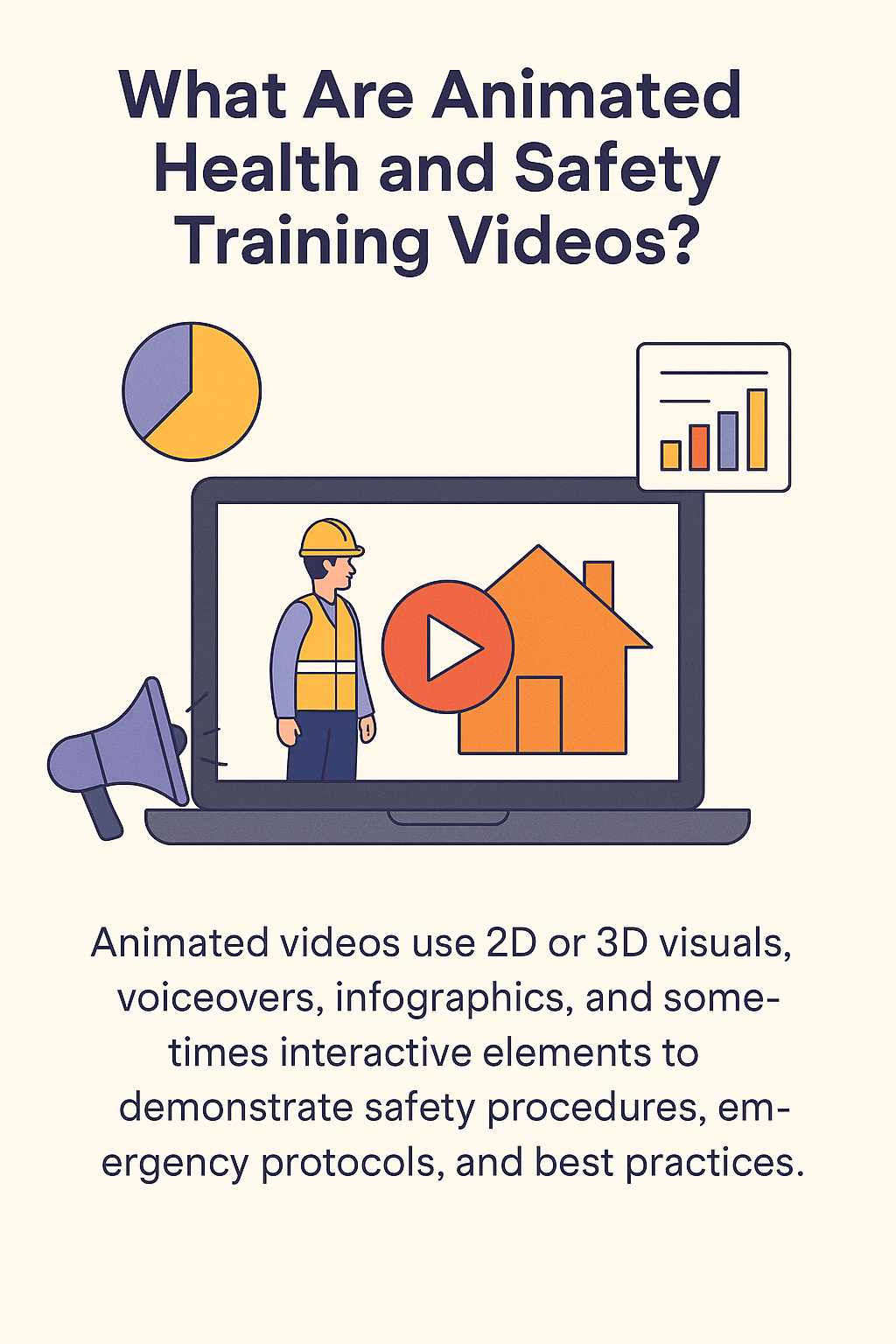Jun 9th, 2025

In the rapidly growing construction sector of the United Arab Emirates (UAE), safety is more than a regulation—it’s a priority. As the country continues to lead major infrastructure and real estate projects, ensuring the well-being of thousands of workers on-site has become essential. One effective and innovative way companies are addressing safety training is through animated health and safety training videos.
These engaging, visual tools are transforming traditional training methods into interactive and easy-to-understand modules. Let’s explore how animated safety videos are revolutionizing UAE construction safety, boosting compliance, and ultimately saving lives.
The UAE is home to some of the world’s largest construction projects—from the Burj Khalifa to Expo City Dubai. With a large percentage of the workforce comprising migrant laborers, safety training presents unique challenges:
Language barriers
Cultural diversity
High-risk tasks
Fast-paced project timelines
The Ministry of Human Resources and Emiratisation (MOHRE) highlights that injuries on construction sites rank among the highest reported workplace accidents in the UAE. This highlights the urgent need for effective safety communication tools that go beyond manuals and lectures.
External Source: UAE MOHRE Health and Safety Guidelines

Animated safety videos use 2D or 3D visuals, voiceovers, infographics, and sometimes interactive elements to demonstrate safety procedures, emergency protocols, and best practices.
Instead of relying solely on trainers or printed materials, companies use animations to:
Visually depict real-life accident scenarios
Simplify complex safety instructions
Overcome literacy or language barriers
Keep employees engaged
This format is especially beneficial in the UAE construction industry, where most site workers are from diverse linguistic backgrounds like Hindi, Urdu, Bengali, and Tagalog.
Animated videos convert technical information—such as fall protection, scaffolding setup, or PPE usage—into understandable visual stories. This is crucial when employees have limited formal education.
You can easily localize safety animation videos into multiple languages. Even if the worker doesn’t fully understand English, visual cues and familiar voices make the training more effective.
Studies show that visual content improves learning retention. A well-made animation can make a lasting impression, helping workers recall procedures in real-life situations.
Once created, videos can be reused across multiple projects, reducing the cost and time of live training sessions. They also ensure consistent messaging across all teams.
For remote job sites or during onboarding, construction training animation can be delivered digitally, making safety accessible anytime, anywhere.
When a new worker joins the project, a 2D animation safety video can show site layout, emergency exits, and hazard zones before stepping on-site.
Before high-risk tasks like welding, excavation, or working at heights, workers can watch specific videos tailored to that activity.
Animated reenactments of previous accidents (real or hypothetical) help reinforce the consequences of ignoring safety guidelines.
Instead of long briefings, daily toolbox talks can include short animations to illustrate the topic of the day, like electrical safety or ladder use.
Both 2D and 3D animation for safety training are effective, but each has its own advantage:
2D Animation: Cost-effective, faster to produce, ideal for procedural or instructional training.
3D Animation: Offers depth, realism, and immersive experience—ideal for simulating complex machinery or site conditions.
Many companies in Dubai and Abu Dhabi prefer a hybrid approach that mixes both styles to match content needs and budgets.
Authorities such as Dubai Municipality, ADNOC, and Dubai Civil Defence encourage digital safety education tools. Compliance with OSHA and UAE labor law is often easier with documented training modules.
Major developers use employee safety training UAE solutions to train large subcontractor teams. They show animated videos on large screens or distribute them via mobile apps.
Animation is increasingly used in offshore platforms and oil fields to simulate high-risk environments.
If you’re a construction company or contractor looking to invest in safety animation UAE services, consider:
✅ Experience in construction industry visuals
✅ Ability to localize languages (Hindi, Arabic, Urdu, etc.)
✅ Proven portfolio with safety animation videos
✅ Fast turnaround for project deadlines
✅ Understanding of UAE compliance standards
One such example is Interactivv Studios L.L.C, a UAE-based animation studio that specializes in 2D and 3D safety animations for the construction and industrial sectors.
To maximize impact and ensure compliance, follow these best practices:
Limit each video to 3–5 minutes. Focus on one topic per video.
Use photos, maps, and references from actual project sites for more relevance.
Add subtitles or voiceovers in the most common worker languages.
Interactive videos can assess comprehension and reinforce learning.
Make sure videos are optimized for mobile devices so workers can access them on-the-go.
As the UAE construction industry adopts more smart technologies and digital tools, animated health and safety training videos are poised to become the new standard.
Future trends include:
AR/VR integration for immersive training
Gamified safety modules to boost engagement
AI-based tracking of worker learning and behavior
With Expo 2020’s legacy and Vision 2030 initiatives, safety innovation will only grow stronger in the UAE.
Health and safety are the foundation of any successful construction project. Traditional training methods are not enough in today’s fast-paced, multilingual construction environments. Animated health and safety training videos offer an effective, scalable, and engaging solution to reduce risks and improve safety compliance.
By embracing this visual approach, construction companies in the UAE can protect their workers, ensure compliance with labor laws, and maintain a safe and productive workforce.
In the rapidly growing construction sector of the United Arab Emirates (UAE), safety is more than a regulation—it’s a priority. As the country continues to lead major infrastructure and real estate projects, ensuring the well-being of thousands of workers on-site has become essential. One effective and innovative way companies are addressing safety training is through […]
Fill out the form below and we will send you a quote today…